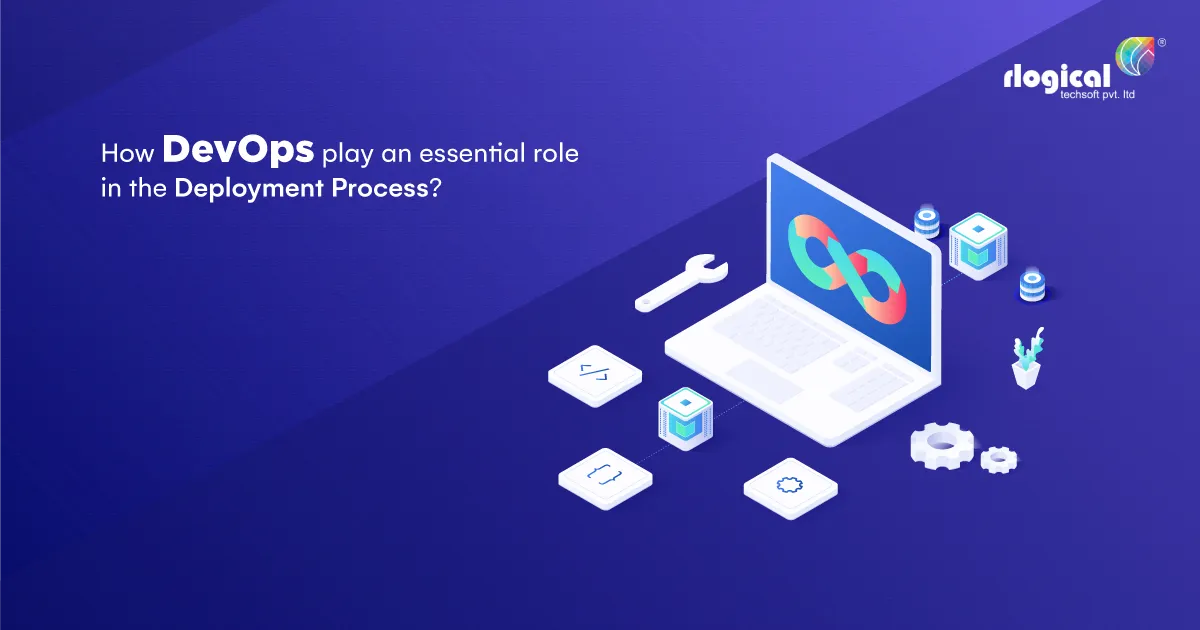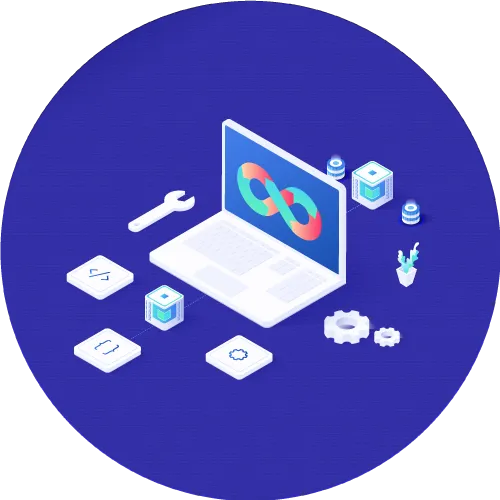
DevOps, which happens to be a combination of development and operations teams, can be considered an organizational approach that allows more straightforward maintenance of present deployments and quicker development of apps. DevOps helps in the promotion of shorter and more controllable iterations using the adoption of innovative tools and best practices by allowing the organizations to develop stronger connections between Dev, Ops, and other stakeholders in the organization. DevOps isn’t a technology by itself, and it covers everything from the organization to tooling, processes, and culture virtually. Preliminary steps typically consist of CI/CD, incident response systems, real-time monitoring, and collaboration platforms.
It is a fact that there is a quick development of DevOps adoption at present. IDC has predicted that the global DevOps software market will be reaching $6.8 billion next year from $3 billion in 2017. The forces that drive the adoption of DevOps consist of enterprise investments in innovation driven by software, enhanced investment by CEOs and CTOs in automated and collaborative application development company, operational procedures, and adoption of architectures based on microservices in addition to associated development processes.
Benefits provided by DevOps
1. Boosts effectiveness with automation
According to Robert Stroud, the late DevOps authority, DevOps is concerned about powering business transformation that consists of individuals, processes, and culture modification. The most effective approaches for DevOps transformation emphasize structural enhancements that create community. An effective DevOps initiative requires a mindset or culture that will bring enhanced collaboration between several teams.
What type of tangible advantages will DevOps bring? DevOps focuses on deploying software more frequently, securely, and dependably through automation by managing engineering procedures end to end.
2. Optimizes the business as a whole
Patrick Debois, who happens to be a system architect and the developer of the DevOps movement, mentions that DevOps’ most significant benefit happens to be the insight provided by it. It compels the companies to optimize for the entire system and not only IT siloes for improving the entire business. Be more data-driven and adaptive for aligning with the customers and the business’s requirements.
3. Enhances stability and speed of software deployment and development
A multi-year evaluation has found in the yearly Accelerate State of DevOps Report that top-performing DevOps companies perform much better on software development or deployment stability and speed and achieve the main operational specification of making sure that their service or product is obtainable to the end-users. However, given that DevOps’ definition is somewhat fuzzy, how is it possible for an organization to figure out whether its DevOps initiatives are paying off? The 2019 Accelerate report has also named as many as five performance metrics – lead time (the time is taken by it for going from committed code to code running successfully in production), change fail, deployment frequency, availability, and time to restore – that provide a top-level view of software performance and delivery, and predict the possibility of DevOps success.
4. Allows you to emphasize what matters most: Individuals
The most significant component of a typical DevOps initiative is individuals and not tools. Key role players (in this case, humans) can enhance your possibility of success to a great extent, for example, a DevOps evangelist who will be able to explain the business advantages fostered by the greater suppleness of DevOps practices plus get rid of fears as well as misconceptions. Moreover, because automated systems are essential for DevOps’ success, an automation specialist can create strategies for continuous deployment and integration, making sure that production and preproduction systems are completely flexible, software-defined, highly available as well as adaptable.
Must Read: How Coronavirus affected the IT or Technology Sector?
Common DevOps Engineer Roles and Responsibilities
After mentioning the benefits provided by DevOps, we will begin to see the common roles and responsibilities of DevOps out there. Let us break down how IT and engineering teams are benefited from these processes.
1. Planning, testing, and development of application and infrastructure
It is a fact that the entire DevOps team happens to be responsible for planning, testing, and the development of infrastructure and applications. You are sharing the accountability for the development as well as release pipeline results in more dependable services. Being an integral part of a DevOps team does not imply that you have a whole team comprising DevOps Engineers; however, a DevOps-oriented company will be spreading the responsibility for application and infrastructure planning testing, plus release across the whole IT and engineering organization.
2. Maintaining CI/CD pipelines
Being a DevOps team member implies that you are accountable for creating a CI/CD pipeline and optimizing individuals, tooling, and processes. Engineers who happen to be DevOps-minded will look for ways in which they will be able to improve the pipeline continuously. The team will shift QA and testing further left into the cycle for development, enabling the team to test continuously without limiting speed.
Must Read: Android CI / CD with GitLab
3. Automation implementation
As mentioned earlier, automation can be considered to be an essential principle of DevOps. Consequently, the DevOps teams are accountable for the implementation of this automation. Every individual from the front-end team to the data team is accountable for automating tasks and enhancing IT and engineering efficiency. It will be possible for you to emphasize more strategic advancement by automating mundane chores constantly.
4. On-call, incident management, and incident response
With code ownership and shared responsibility, DevOps teams need to take incident management work and on-call responsibilities. However, it will be possible for the DevOps team to learn more regarding their systems by responding to production incidents. Consequently, DevOps for developers start writing code over time that fits into their infrastructure and application much better, resulting in fewer incidents.
5. Monitoring
Lastly, we like to mention that DevOps teams are accountable for implementing actionable monitoring solutions. The organization needs to accumulate data and understand how to take action with it. The DevOps team is accountable for revealing blind spots in their infrastructure and applications and then comprehending how they can monitor those services. Monitoring happens to be one small step for creating highly observable systems; however, it is important to create reliable systems.
Challenges of DevOps
A DevOps initiative comes with many challenges. Your organization needs to reimagine a structure for improving how things get done. The volume of work needed in a DevOps transformation is often underestimated by the companies, though. It is estimated that approximately 70% of DevOps initiatives through last year will not be able to satisfy their objectives because of problems around organizational learning.
1. It is difficult to choose the right metrics
It is important for companies transitioning to DevOps practices to identify progress and document success, and reveal areas needing more improvement. For instance, a speeding up of deployment velocity without any corresponding enhancement in quality cannot be considered a success. An effective DevOps effort will require metrics driving smart automation decisions, and even though companies tend to struggle with DevOps metrics quite often.
So, where to begin? Find metrics aligning with velocity as well as throughput success.
2. Inadequate funds
DevOps initiatives also face other adversities. Adjustments are going to take time, given that so many organizations and IT changes are involved. As per a survey conducted by the IT executives from Pensa, the main challenges to the success of DevOps are:
- Insufficient budgets
- Application complexity
- Legacy systems
- Company culture
- Difficulty handling multiple environments
3. Complexity
DevOps efforts might be delayed in complexity. IT leaders might find it difficult to articulate their work’s business value to the main executives. When it comes to governance, will standardization and centralization result in better outcomes, or simply more innovation layers – killing bureaucracy? Moreover, organizational change: Would it be possible for your teams to overcome resistance to inertia and change, unlearning many years of performing things in a particular manner, learn from others and share their practices, and orchestrate plus integrate the proper tools?
4. DevOps can be wrecked by bad metrics and unrealistic goals
There are many reasons why DevOps efforts might fail, including tracking metrics not aligning with business objectives, setting impractical expectations, or implementing a DevOps effort that happens to be half-baked embracing agile procedures while keeping engineering or development teams and IT ops in conventional silos.
Must Read : Top 5 Benefits of Hiring IT Outsourcing Companies in India
DevOps Future
Although DevOps’ future is probably going to bring alterations in organizational and tooling strategies, its primary mission is going to remain the same.
1. A significant role will be played by automation
Automation will play a crucial role in the transformation of DevOps, while AIOps (artificial intelligence for IT operations) will allow the companies to attain their DevOps targets. The core AIOps elements such as performance baselining, machine learning, automated root cause analysis (RCA), anomaly detection, and predictive insights will be working together to speed up the operational chores. This developing technology is going to be a vital part of DevOp’s future.
2. Focus more on cloud optimization
The future of DevOps will give the usage of cloud technologies a greater focus. The cloud’s centralized nature will provide a standard platform for DevOps automation for testing, deployment, and production.
And irrespective of what the future brings advanced technologies, it is essential for the companies to comprehend that DevOps is concerned about the journey and that the DevOps-related expectations and objectives will evolve with the advent of time.
Rahul Panchal
Rahul Panchal is the Founder & Managing Director at Rlogical Techsoft Pvt. Ltd. He is a pioneer tech enthusiast who has assisted diverse enterprise solutions with a fresh perspective over the years. From integrating technologies like Full-Stack, .NET, Flutter & PHP, he has harnessed custom web or hybrid mobile app development projects. His creative outlook on the latest models of AI, ML, blockchain, and IoT, has made various businesses attain leading-edge success.
Related Blog
- No Related Blog.
Categories
- All
- Amazon Web Services (AWS)
- ASP.Net Development
- Azure Web App
- Big Data Analytic
- Customize
- Digital Marketing
- Drupal Development
- E-commerce web development
- Education Mobile App Development
- Enterprise Application
- Event Management App Development
- Fintech
- Fitness App Development
- Food Delievery
- Front-End Development
- Healthcare App Development
- Hire Dedicated Developers
- Hotel Booking App
- IT Industry
- JavaScript Development
- Mobile App Development
- On Demand App Development
- On Demand Healthcare App Development
- PHP Development
- POS Software Development
- Real Estate Mobile App Development
- Retail Business App Development
- Salesforce
- Social Media Development
- Software Development
- Technology
- Transportation App Development
- UI/UX Design
- Web Design
- Web Development
- Web Services
- Web/Data Scraping Services
- WordPress



 Rahul Panchal in DevOps Engineer
Rahul Panchal in DevOps Engineer 






